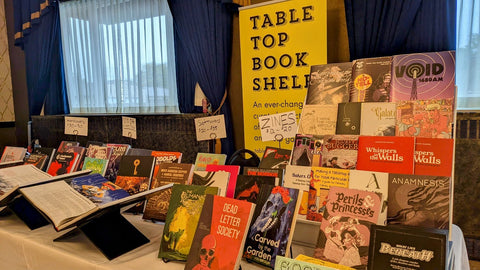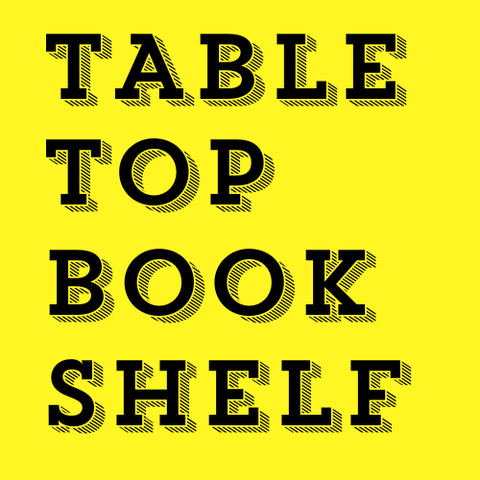This weekend, Tabletop Bookshelf had its first in-person selling event at the Awkward Nerd Book Fair on September 22, 2024 in Milwaukee, Wisconsin. This was the event’s third year, held in a new space, with a few dozen vendors and artists. The fair also featured local and national authors and personalities who gave talks and signed books.
I had steady sales throughout most of the day and gained a wealth of learnings. Here they are, in no particular order!
I brought way too much (heavy) inventory
My lower back is not happy with me. While I had steady sales, I brought way more inventory than I needed. I had no idea what to expect and was irrationally scared about stock outs, something I constantly worry about with the online sales. In retrospect, if I had done some simple math based on rough sales estimates, I could’ve been more realistic, especially with the heavy hardcovers, which brings me to my next lesson.
Big hardcovers were a bust, but…
I only sold one of my big, full-sized hardcover books, a copy of DIE RPG, to a TTRPG enthusiast. Despite the low sales, the hardcovers had a great presentation effect in a physical space, displayed on stands, open for people to flip through. They were a great way to ‘invite’ people into the shop and drove a lot of discussion, especially the Cowboy Bebop RPG which was a good choice to bring newcomers into the space and hobby.
Zines and softcovers are the winners, but...
I sold mostly zines and softcovers, with the biggest winners being the lowest-priced titles. I’m curious how much of this was driven by the location and presentation of those titles—stacked near a corner. Overall, I think displaying more of my inventory in stacks on the table would’ve been a better choice. Next time, I’ll probably do this for a few and put one on a stand at the top. The one issue I had is these titles are harder to transport without a few getting damaged, though I learned some tricks that should minimize this next time.
Cards and dice were fine
I brought cards and dice, which I didn’t sell much of, but having a dice tray out with the big metal D100 had the intended effect of drawing people in. People want to touch that chonky copper dude! The issue is, lots of vendors sell dice, and there were better selections at other tables. Same thing goes for Tarot. However, they did not take up a lot of space and helped communicate what the shop was all about. I’ll be bringing them to future events.
No Cash, No Problem
Originally, I had a lot of anxiety about not accepting cash, but no one had a problem with it. People were happy to use the tap & chip I had, but relying on the tablet for the Point of Sale (PoS) activities was a little slow and sometimes cumbersome. I also didn’t have phone number acceptance set up in time, so if someone wanted a receipt, they only had the email option. Most people weren’t worried about having a receipt, but one or two customers preferred the phone number option.
Power and Hotspots
I didn’t have any issues with power, but next time I’ll bring an extension cord and battery packs to get rid of that anxiety. If I don’t have electricity, the shop is shut down. Same thing with WiFi. The provided WiFi was not adequate, and I ended up sharing a hotspot with Table Cat Games (Thanks, Paul!). But I lost connection to that at one point as well, started to freak out, and then remembered I could use my phone as a hotspot. And that worked great! I may end up investing in a dedicated hotspot for the long term.
Connection Was the Most Important Part
Sounds cheesy, but it’s true. Getting to connect with lots of local gaming creators and enthusiasts was incredibly important and fun. I got to chat about 5E with Ben Riggs, talk TTRPGs with Rob Weiland, and even had the opportunity to sell one of Alex Kammer’s new books, The End of Everything, after connecting with him.
But speaking with all the attendees was where most of my learnings occurred. It was invaluable to get firsthand feedback on how the attendees responded to the setup, different talking points, and different titles. Most people had no idea that journaling games existed. Those were educational opportunities, and it was easy to pull great examples from the collection. I loved getting to tell people about all the titles and dropping tidbits about the creators or where the books came from.
After the nerdy dust had settled, one thing was clear: I run a real bookstore, and though Tabletop Bookshelf will always be e-commerce first, tangible books sell best when people can pick them up and flip through them. I’ll be exploring more ways to make this happen in the months to come, both at in-person events and eventually in a unique physical space where the books can get the display they deserve and players get the space they need.




